Australians
doing Battle at Rensburg Siding during Anglo-Boer War
Author:
A.M. van Rensburg (b4 c2 d1 e6 f5 g5 h3 i2)
Webmaster:
M.A. van Rensburg (b4 c2 d1 e6 f5 g5
h3 i2 j1)
Back
to home
Back
to Historical
The
Van Rensburg's of Rensburg Siding, Colesberg, Cape part
1
The Anglo-Boer War Introduction
part 2
The Anglo-Boer War around Rensburg Siding: Boer Leaders part
3
The Anglo-Boer War around
Rensburg Siding Nov 1899 part
4
The
Anglo-Boer War around Rensburg Siding Dec 1899 part
5
The
Anglo-Boer War around Rensburg Siding Jan 1900 part
6
The Anglo-Boer War around
Rensburg Siding Feb 1900 part 7
The
Anglo-Boer War in retrospect part
8
Australian units, persons and casualties part
9
MAIN
MAP source http://www.mjvn.co.za/anglo-boer/mainmap1.jpg
The
Anglo-Boer War: Australians capture De Wet's artillery gun at Rensburgdrift
part 10
Page
1 Page 2
The
Anglo-Boer War around Rensburg Siding:
Boer Leaders
The
Boers were not soldiers, the majority of them were mere farmers who wanted to
protect themselves from an imperialistic empire. Colesberg with its kopjes
was natures provision of natural forts used by the Boers against a far greater
enemy. There
was no big decisive battle, rather the battle field was stretched out over many
kilometers as both sides tried to cut the other off, the opposing sides always
ensuring that their flank or flanks were being covered al all cost.
General
Hendrik Jacobus Schoeman
Born 11 July 1840, died 26 May 1901.

General Hendrik Johannes Schoeman (1840-1901).
He surrendered on 5 June 1900 to General French, two days after
the fall of Pretoria.
He was arrested July 1900 by Commandant PF Coetsee while sitting at his home.
He was seen as a 'hands-upper'.
Later he and some friends were blown to smithereens
when a lyddite shell, which he had brought back from Colesberg and which graced
his parlour, exploded when it was used as an ashtray - an occurrence which pious
Boers
saw as the 'finger of God on a traitor' Military History Journal -
Vol 3, No 1,
The Hands-Uppers, by V.E. Solomon
http://rapidttp.co.za/milhist/vol031vs.html
Schoeman
was the Boer general in charge at the beginning of the war facing General John
French in 1899 at Norvalspont. He operated in a very cautious manner and never
took hold of the opportunity to give the foreign forces a decisive punch when
the opportunities were presented to him, in fact his approach had a negative
influence on his men. In addition to this Schoeman became disolutioned and angry
when General H.R. Lemmer was appointed as Head Commandant, taking the place
of General De la Rey. Schoeman's own men were placed under the command of General
Lemmer and Schoeman was asked to assist A.D. Wolmarans in Bloemfontein to round
up deserters and enlist them on commando duty. The reluctant Schoeman did not
want this, and started a campaign of undermining Lemmer and De la Rey. He was
able to persuade some of his commandants (Preller and Havemann) to continue
the agitation and undermining. Schoeman hereby went to Pretoria to complain
to President Paul Kruger about the whole matter. As he had hoped for, Kruger
appeared to be very lenient towards him.
In
June 1900 Schoeman surrendered to the English. He was then accused of treason
by the Boers, since on 7 October 1900 he accompanied Captain WP Anderson of
the South African Constabulary to enter talks of surrender and peace with General
De la Rey. On 13 December 1900 he was taken in custody at Pietersburg (today
Polekwane), but he was set free on parole. He died after throwing a match in
an old lyddite bomb which he was using as an ashtray. The unexpected explosion
that followed led to his equal unexpected death. The Boers believed that this
was the wrath of God upon him, since he laid down his arms against the enemy.
In personal correspondence with Alwyn P Smit, he mentioned that his grandfather
MJ de Jager, while at Warmbad, was the prison guard for the period of four days
of Anderson and Schoeman when they were caught by the burghers between Pretoria
and Rustenburg in the Transvaal (ZAR).
D.J. Potgieter (editor) SESA, IX, pp. 516 -517.
A.M. Grundlingh, Die "Hensoppers en Joiners", pp. 86 - 89.
Alwyn. P Smit (red.), Gedenkboek van M.J. de Jager (1872 - 1939), Boerekryger,
Staatsartilleris en militêr, pp. 96 - 97.
General
FA (Groot Freek) Grobler
Born c 1850 and died 13 May 1901 at Sterkfontein, district of Waterberg
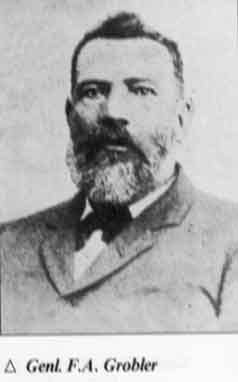
Source: Jacques
Malan, Die Boere-offisiere van die Tweede Vryheidsoorlog 1899 - 1902
FA
Grobler fought in the first war of independence in the 1880's, and also in the
1890's against Makhado, Makgoba, Malebogo en Mphephu. In 1891 he was the veldkornet
of Swagershoek, district of Waterberg. In October 1899 he served as assistant
general for Waterberg and Soutpansberg. While there he also had to take care
of the northern and north western border of ZAR. The first place where he made
his presence felt was at Rhodesdrif, by blowing up the railway line to Bulawayo.
His burghers refused to go and fight on the other side of the border. When Grobler
was ordered to go to Colesberg in January 1900, he went under protest. Though
he was second in command, he was not a particlular good assistant to General
Lemmer.
After Bloemfontein fell he returned with Lemmer via the Eastern Free State to
the ZAR, where in May 1900 he fought against lord Roberts at Kliprivier near
Johannesburg and also at Tabaksberg. When Pretoria fell in June 1900, he returned
to the north and acted as liaison between Generals Louis Botha and Koos de la
Rey. De la Rey was not impressed with his leadership in general. He was dismissed
from his position on 6 September 1900 and replaced by General C.F. Beyers. Nevertheless
he continued to fight as a burgher, but later contracted fever and died on his
farm in 1901.
Nienaber 1: p.92; OKO: pp. 33, 34, 112; SABW III, p. 363;
Alilali Tshilamulele Mphephu (ca. 1868 - 1924), Venda-opperhoof. D.W. Krüger
and C.J. Beyers (editor), SABW, vol III, p. 656;
Gedenkboek van M.J. de Jager (1872 - 1939) Boerekryger, Staatsartilleris
en militêr, p. 8;
Ian Uys, South African Military Who's Who 1452 -1992, p. 95.
Esaias Reinier
Grobler
He was born near Philippolis 3 Jan 1861 and died at Bloemfontein 31 Aug 1937.
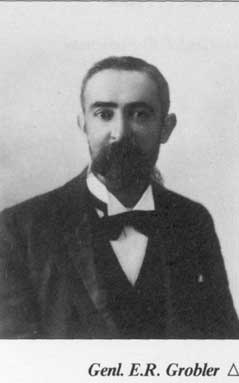
ER
Grobler was a member of the Free State Volksraad from 1886. In 1893 he attended
the Chicago World Expo. Grobler was also vice-chairman of the Volksraad and
chaired its last meeting in 1899.
During the ABO he commanded burghers on the Cape border and was one of the chief
cmdts under General Hendrik Schoeman. He was commander in chief of the southern
Free State forces. Grobler defeated General Gatacre at Stormsberg and also fought
at Colesberg and Paardeberg. He took leave in January 1900 and he was
replaced by Piet de Wet. Grobler was wounded near Springfontein, and taken as
POW and held at Bloemfontein. From 1907 - 1910 he was president of the legislative
council of the Free State and became a senator after union. From 1915 - 1922
he was administrator of the OFS.
South African Military Who's Who 1452 -1992, p. 95.
General Schoeman on Monday 13 November left at 8 am with a commando from Donkerpoort
to go to Allemansdrift where he would join head commandant ER Grobler. Together
they crossed the Orange River (Gariep) to go to Colesberg. Commandant
Preller stayed behind with the supply wagons and his place was filled by commandant
Daniel Marais from Pretoria.
A.G. Oberholzer (compiler), Oorlogsdagboek van Jan F. E. Celliers 1899 -
1902, p. 25n. This note refers to J. Schoeman, Generaal Hendrik Schoeman
-- was hy 'n verraaier? Pretoria, 1950, p. 123.
Olivier
who was in the Free State received a letter dated 27 November with instruction
to go to Stormberg and take over command from ER Grobler. Since Grobler was
instructed to go to Naauwpoort to stop the English advance. Grobler proceeded
to Naauwpoort via Steynsburg.
A.V. Oosthuizen, Rebelle van die Stormberg, p. 72.
According
to Albert Grundlingh, ER Grobler decided to discontinue fighting and
subsequently had handed in his weapons during March 1900, Grundlingh thus accusing
Grobler of being a "hensopper". Grobler also proposed to
Lord Kitchener that they should work towards getting a quorum of the Volksraad
that opposed the war. Grobler, a member of the Free State Volksraad for Philippolis,
was of opinion that the "farcical manner" in which the Peace Committees
(vredeskommittees) handled matters would not be successful.
Albert Grundlingh, Die "Hendsoppers" en "Joiners",
p. 138.
After Grobler was
taken captive he was put in the Bloemfontein concentration camp. Being
held there is another indicator that he voluntarily handed in his arms.
Commandant
Robert Clunie Logie Preller
born 5 May 1846 at Pietermaritzburg, Natal, and died 1916
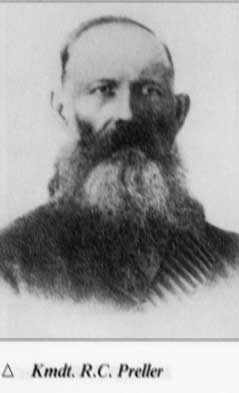
Source: Jacques
Malan, Die Boere-offisiere van die Tweede Vryheidsoorlog 1899 - 1902
The
Preller family moved to the Transvaal in 1861, and in 1865 to the Free State.
He fought in the Basuto war 1865 and 1868 at Naauwpoort, Thaba Bosigo and Korannaberg.
With the war against Sekhukhne he was an assistant veldkornet, with the war
against Mapocho he was only a burgher. He served from 1893 - 1895 as a member
of the Soutpansberg occupation commission. In 1899 he was commandant over some
Johannesburg and Pretoria burghers fighting in the southern Free State. He was
wounded 7 Sep 1901 in the Colesberg area, where he fought the enemy with General
Hendrik Schoeman and taken as POW to Shajahanpur, India. He was from the farm
Klipdrif in the Pretoria district and was married to Stephina Schoeman, a daughter
of commandant-general Stephanus Schoeman. Their son, Gustav Schoeman Preller
(*Pretoria 4 Oct 1875 - Pelindaba, district Pretoria, 6 Oct 1943) became a well
known journalist, a campaigner for the Afrikaans language, and a keen historian.
Commandant Preller died in 1916.
W. J. de Kock (editor), Suid-Afrikaanse Biografiese woordeboek, Deel 1,
p.673;
Jacques Malan, Die Boere-offisiere van die Tweede Vryheidsoorlog 1899 -
1902, p. 116;
J.H. Breytenbach, Die geskiedenis van die Tweede Vryheidsoorlog in Suid-Afrika,
1899 -1902, I, p. 193;
Die geskiedenis van die Tweede Vryheidsoorlog in Suid-Afrika, 1899 -1902,
IV, pp. 10, 23, 441, 449.
General
Hermanus Richard Lemmer
Born 29 June 1849 at Hartebeesfontein in the district Potchefstroom, died December
1900
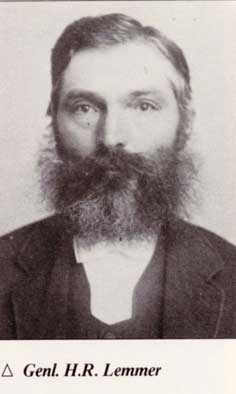
Source: Jacques
Malan, Die Boere-offisiere van die Tweede Vryheidsoorlog 1899 - 1902
In
1886 HR Lemmer fought for Moshete against Machua in the Western Transvaal and
was wounded. Before the ABO he was a member of the first Volksraad. In October
1899 as a burgher he joined the Boer war effort in Natal, where he was promoted
to general. He operated and fought mainly at Colesberg, the Free State and Western
Transvaal. He was very successful at Slingersfontein and Keeromskop. He is also
remembered for the battles he fought in the Northern Cape and against lord Methuen.
He also fought at Kraaipan and later took part in numerous actions. Unfortunately
he had a disease of the kidneys and this forced him to relinquish his authority
to command G. Gravett. After the fall of Pretoria and the Battle of Diamond
Hill [at Donkerhoek] he was sent to the north of Pretoria to reorganise burghers
from the Western districts.
Lemmer died in battle against lieutenant colonel C.G. Money, whose convoy he
attacked in December 1900 somewhere between Lichtenburg and Marico.
Die Boere-offisiere 1899 - 1902, p. 40;
South African Military Who's Who 1452 -1992, p. 131.
Pieter Daniel de Wet
Born De Wetsdorp 18 August 1861, died at Lindley 27 February 1929
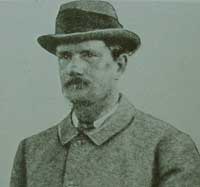
Boer leader
General Piet de Wet
Piet de Wet was the brother of C.R. de Wet. During the first war of
Independence, he fought with the Transvalers at Majuba [1881]. He settled at
Lindley and was elected to the OFS Volksraad. At the outbreak of the ABO War
he was amongst the first to attack Ladysmith, Natal.
De Wet was then sent to Colesberg and soon promoted to general. He
then distinguished himself at Abrahamskraal, Sanna's Post and Lindley. In July
he surrendered to the British and became one of the "National Scouts leaders".
After the war he returned to farming.
South African Military Who's Who 1452 -1992, p. 65.
Pieter Daniel (Piet) de Wet he was born on Nuwejaarsfontein in die district
of Dewetsdorp. In 1881 he fought under General PJ Joubert in Natal and in 1882
against the Nyabela in the ZAR. In 1883 he farmed at Lindley and in 1890 he
accompanied his brother Christiaan to Heidelberg, ZAR. He subsequently returned
to Lindley and in 1892 he became a member of the Free State Volksraad, a position
held till 1898.
In 1899 he fought for the Boers at Ladysmith in Natal and from there he went
to Colesberg. When General Grobler became ill, president M.T. Steyn
appointed De Wet in his place as the Commandant. On 16th December De Wet defeated
the British at Vaalkop. In January 1900 he captured 500 English POW.
After the relief of Kimberley he fought with his brother at Modderrivier and
Abrahamskraal. On 19 July 1900 he entered in talks at Rietrivier with is brother
and expressed to him that the war was futile.
Not only was he a "hensopper" but he even became the chair of the
Burgher Peace Committee. In Augustus 1900 he became the leader of the
Orange River Colony Volunteers and took up arms against his own people.
He and his brother became estranged and he was despised as a traitor (verraaier)
in Afrikaans history.
Die Boere-offisiere 1899 - 1902, p. 28;
Albert Grundlingh, Die "Hendsoppers" en "Joiners",
p. 296.
Page
2 Cotinued
Back
to Historical van Rensburg's
Back
to home
andre@Rensburg.com





